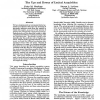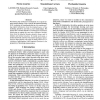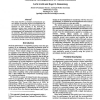AAAI
1994
14 years 1 months ago
1994
This paper describes an extension to the constraint satisfaction problem (CSP) approach called MUSE CSP (Multiply SEgmented Constraint Satisfaction Problem). This extension is esp...
AAAI
1994
14 years 1 months ago
1994
We have implemented an incremental lexical acquisition mechanism that learns the meanings of previously unknown words from the context in which they appear, as a part of the proce...
AAAI
1994
14 years 1 months ago
1994
Between sensing the world after every action (as in a reactive plan) and not sensing at all (as in an openloop plan), lies a continuum of strategies for sensing during plan execut...
AAAI
1994
14 years 1 months ago
1994
Formalizing the ontological commitment of a logical language means offering a way to specify the intended meaning of its vocabulary by constraining the set of its models, giving e...
AAAI
1994
14 years 1 months ago
1994
' This paper describes a computer accompaniment system capable of providing musical accompaniment for an ensemble of performers. The system tracks the performance of each musi...
AAAI
1994
14 years 1 months ago
1994
To navigate effectively, an autonomous agent must be able to quickly and accurately determine its current location. Given an initial estimate of its position (perhaps based on dea...
AAAI
1994
14 years 1 months ago
1994
This article shows how rational analysis can be used to minimize learning cost for a general class of statistical learning problems. We discuss the factors that influence learning...
AAAI
1996
14 years 1 months ago
1996
Recent work in supervised learning has shown that a surprisingly simple Bayesian classifier with strong assumptions of independence among features, called naive Bayes, is competit...
AAAI
1996
14 years 1 months ago
1996
Constraint satisfaction consistency preprocessing methods are used to reduce search e ort. Time and especially space costs limit the amount of preprocessing that will be cost e ec...
AAAI
1996
14 years 1 months ago
1996
Truth maintenance systems provide caches of beliefs and inferences that support explanations and search. Traditionally, the cost of using a TMS is monotonic growth in the size of ...



